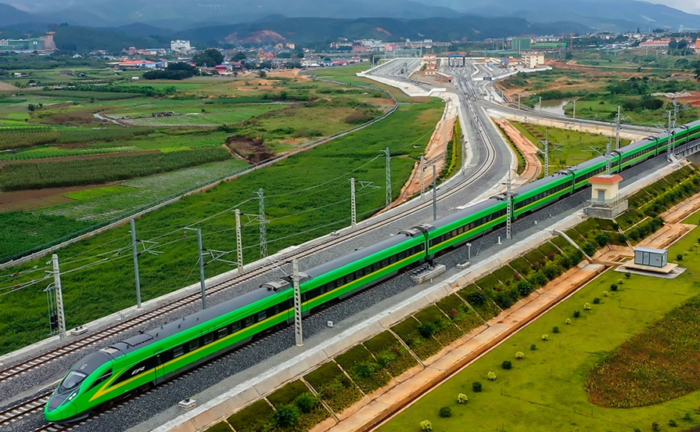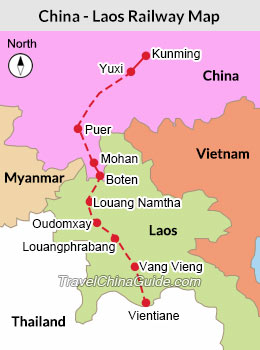
Train exports potash fertilizer and rubber
VIENTIANE, Jan. 4 (Xinhua) — Just after one month’s operation, the China-Laos Railway has demonstrated its advantages and favorable effects in passenger and freight transportation.
The China-Laos Railway, which connects Kunming, the capital city of southwestern China’s Yunnan Province, and Vientiane, the capital of Laos, was opened on Dec. 3. In the past month, the railway’s passenger service has greatly facilitated transportation in northern Laos, while its freight service has given a boost to bilateral economic and trade exchanges.
The Laos-China Railway Co. (LCRC), a joint venture in charge of the operation of the railway’s Lao section, said on Monday that as of Sunday, the Lao section has operated 64 pairs of electric multiple unit (EMU) trains, carrying a total of 45,800 passengers, and run about 50 pairs of freight trains, having sent a total of 49,900 tons of cargo to China.
Despite the COVID-19 pandemic, it is not easy to buy tickets for EMU trains of the China-Laos Railway on weekends or holidays. Many people queue up at the railway stations to buy tickets to experience the bullet train travel, now a convenient, safe and fast option for Lao people.
Since the railway came into service, freight trains from Vientiane to China have always been busy and fully-loaded.
The potash fertilizer manufactured by a China-Laos joint venture, named Sino-Agri International Potash Company, was transported on the railway’s first international cargo train to China.
“Potash fertilizer arriving in Kunming through the China-Laos Railway has been sold in the market,” Tong Yongheng, general manager of the company, told Xinhua on Monday.
“The China-Laos Railway has added a safer, more stable and convenient path for our Lao factory to ship (our products) directly to China. The better sale of our products increases the income of the Lao government, as well as plays an important role in ensuring the supply of potash fertilizer in China, which is mutually beneficial and win-win,” Tong said.

The company’s laboratory technician Nuina Siphabod was a villager near the company. She said after the company’s project was launched, the surrounding villages have undergone great changes and development. “The opening of the Laos-China Railway is improving the transportation in Laos, and I hope the railway benefits the Lao people and brings Laos and China closer,” she said.
The rubber produced and processed by the Yunnan Rubber Investment Company (YRIC) under China’s Yunnan State Farms Group in Laos also rode Laos’ first international train back to China. The rubber company is now planning to expand and reorganize its layout in Laos.
“The China-Laos Railway is good for the development of Laos, good for our company and the people, especially for those engaged in rubber plantation,” Xieng Vanthong, deputy manager of the production and operation management department of the YRIC, told reporters.
The rubber produced by the company is sold in China, where the market price is favorable, and the China-Laos Railway’s opening has helped reduce the company’s transportation cost and enhance its confidence, said the deputy manager.
The Chinese company has been engaged in replacement plantation in Laos since 2005, and has so far invested a total of over 1 billion yuan (157 million U.S. dollars) in the Southeast Asian country, having established 21 rubber plantation bases and recruiting over 6,000 local people.
“The opening of the China-Laos Railway has greatly promoted the exchange of personnel and goods between the two countries, which is conducive to the foreign trade between China and Laos,” Li Mufan, deputy general manager of the YRIC, told Xinhua.
During the past month, the company has exported about 4,000 tons of rubber products back to China by the railway, and the figure will be about 50,000 tons a year later, Li said.
Yuan Minghao, general manager of the LCRC, said the railway has greatly facilitated commodity trade and economic cooperation between Laos and China, adding that his company is planning to open “Lancang-Mekong Express” transnational trains to make the China-Laos Railway freight corridor smoother.
by Chanthaphapone Mixayboua, Zhang Jianhua, xinhuanet.
Laos, Laos Train, News, Travel
https://laotiantimes.com/2022/06/07/laos-exports-sticky-rice-to-china-through-railway-system/